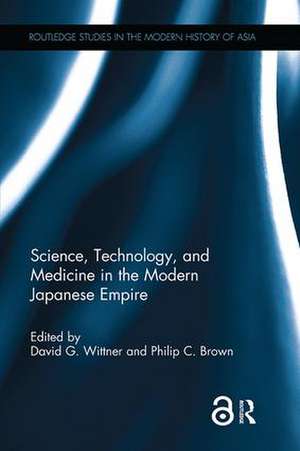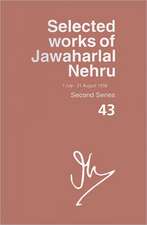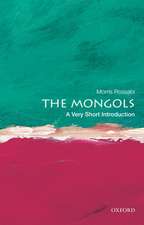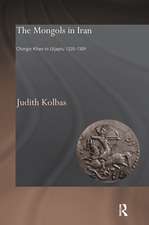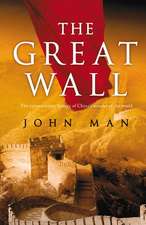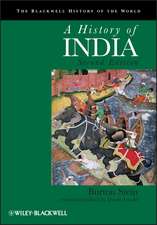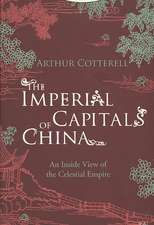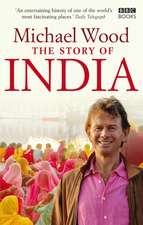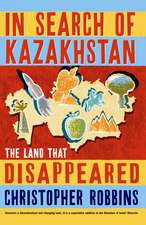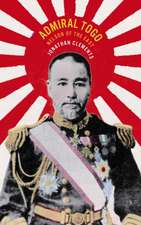Science, Technology, and Medicine in the Modern Japanese Empire: Routledge Studies in the Modern History of Asia
Editat de David G. Wittner, Philip C Brownen Limba Engleză Paperback – 16 iun 2017
This book explores the ways in which scientists, engineers and physicians worked directly and indirectly to support the creation of a new Japanese empire, focussing on the eve of World War I and linking their efforts to later post-war developments. By claiming status as a modern, internationally-engaged country, the Japanese government was faced with having to control pathogens that might otherwise not have threatened the nation. Through the use of traditional and innovative techniques, this volume shows how the government was able to fulfil the state’s responsibility to protect society to varying degrees. The contributors push the field of the history of science, technology and medicine in Japan in new directions, raising questions about the definitions of diseases, the false starts in advancing knowledge, and highlighting the very human nature of fields which, on the surface, seem to non-specialists to be highly rational.
Challenging older interpretative tendencies, this book highlights the vigour of the field and the potential for future development. Therefore, it will be of huge interest to students and scholars of Japanese history, Asian history, the history of science and technology and the history of medicine.
| Toate formatele și edițiile | Preț | Express |
|---|---|---|
| Paperback (1) | 427.16 lei 6-8 săpt. | |
| Taylor & Francis – 16 iun 2017 | 427.16 lei 6-8 săpt. | |
| Hardback (1) | 878.01 lei 6-8 săpt. | |
| Taylor & Francis – 4 apr 2016 | 878.01 lei 6-8 săpt. |
Din seria Routledge Studies in the Modern History of Asia
-
 Preț: 311.33 lei
Preț: 311.33 lei -
 Preț: 311.41 lei
Preț: 311.41 lei -
 Preț: 317.76 lei
Preț: 317.76 lei -
 Preț: 310.95 lei
Preț: 310.95 lei -
 Preț: 311.91 lei
Preț: 311.91 lei - 9%
 Preț: 901.50 lei
Preț: 901.50 lei -
 Preț: 379.30 lei
Preț: 379.30 lei - 25%
 Preț: 711.72 lei
Preț: 711.72 lei - 18%
 Preț: 1278.70 lei
Preț: 1278.70 lei - 18%
 Preț: 948.84 lei
Preț: 948.84 lei - 18%
 Preț: 1055.21 lei
Preț: 1055.21 lei - 18%
 Preț: 1331.76 lei
Preț: 1331.76 lei - 18%
 Preț: 1003.30 lei
Preț: 1003.30 lei - 18%
 Preț: 1060.87 lei
Preț: 1060.87 lei -
 Preț: 424.87 lei
Preț: 424.87 lei -
 Preț: 485.94 lei
Preț: 485.94 lei - 18%
 Preț: 1004.86 lei
Preț: 1004.86 lei - 18%
 Preț: 1326.99 lei
Preț: 1326.99 lei - 18%
 Preț: 1060.87 lei
Preț: 1060.87 lei - 18%
 Preț: 1058.65 lei
Preț: 1058.65 lei -
 Preț: 441.80 lei
Preț: 441.80 lei - 28%
 Preț: 820.03 lei
Preț: 820.03 lei - 18%
 Preț: 1059.84 lei
Preț: 1059.84 lei - 28%
 Preț: 821.79 lei
Preț: 821.79 lei - 18%
 Preț: 1063.65 lei
Preț: 1063.65 lei - 18%
 Preț: 1059.84 lei
Preț: 1059.84 lei - 49%
 Preț: 218.36 lei
Preț: 218.36 lei - 18%
 Preț: 704.83 lei
Preț: 704.83 lei - 18%
 Preț: 1012.10 lei
Preț: 1012.10 lei - 25%
 Preț: 826.86 lei
Preț: 826.86 lei - 18%
 Preț: 1002.63 lei
Preț: 1002.63 lei - 15%
 Preț: 699.14 lei
Preț: 699.14 lei - 18%
 Preț: 1114.30 lei
Preț: 1114.30 lei - 27%
 Preț: 995.07 lei
Preț: 995.07 lei - 26%
 Preț: 765.01 lei
Preț: 765.01 lei - 18%
 Preț: 1059.84 lei
Preț: 1059.84 lei - 26%
 Preț: 821.94 lei
Preț: 821.94 lei - 18%
 Preț: 1056.00 lei
Preț: 1056.00 lei - 18%
 Preț: 1006.07 lei
Preț: 1006.07 lei -
 Preț: 488.71 lei
Preț: 488.71 lei - 18%
 Preț: 999.46 lei
Preț: 999.46 lei - 18%
 Preț: 1051.55 lei
Preț: 1051.55 lei - 18%
 Preț: 1065.78 lei
Preț: 1065.78 lei - 25%
 Preț: 769.10 lei
Preț: 769.10 lei - 18%
 Preț: 1054.43 lei
Preț: 1054.43 lei - 26%
 Preț: 765.01 lei
Preț: 765.01 lei - 18%
 Preț: 1009.21 lei
Preț: 1009.21 lei
Preț: 427.16 lei
Preț vechi: 502.54 lei
-15% Nou
Puncte Express: 641
Preț estimativ în valută:
81.73€ • 85.57$ • 67.63£
81.73€ • 85.57$ • 67.63£
Carte tipărită la comandă
Livrare economică 05-19 aprilie
Preluare comenzi: 021 569.72.76
Specificații
ISBN-13: 9781138302532
ISBN-10: 1138302538
Pagini: 312
Ilustrații: 22 Halftones, black and white; 22 Illustrations, black and white
Dimensiuni: 156 x 234 x 17 mm
Greutate: 0.45 kg
Ediția:1
Editura: Taylor & Francis
Colecția Routledge
Seria Routledge Studies in the Modern History of Asia
Locul publicării:Oxford, United Kingdom
ISBN-10: 1138302538
Pagini: 312
Ilustrații: 22 Halftones, black and white; 22 Illustrations, black and white
Dimensiuni: 156 x 234 x 17 mm
Greutate: 0.45 kg
Ediția:1
Editura: Taylor & Francis
Colecția Routledge
Seria Routledge Studies in the Modern History of Asia
Locul publicării:Oxford, United Kingdom
Public țintă
Postgraduate and UndergraduateCuprins
Introduction Part I: Science, Technology and Industry in the Creation of a New Japan 1 "Coke, Christ, and the Japanese Empire" 2 Academia-Industry Relations: Interpreting the Role of Nagai Nagayoshi in the Development of New Businesses in the Meiji Period and Beyond 3 An Emperor’s Chemist at War and in Peacetime: Sakurai Jōji during the Russo-Japanese and First World Wars Part II: State, Experts and Imperial Medical Policy 4 Cholera, Buddhism, and Public Health: The Story of an Ephemeral Chimera in Meiji Japan 5 Freedom of the Press during the Siberian Intervention: The Taisho Democracy and the Influenza Pandemic of 1918 6 The Politics of Manic Depression in the Japanese Empire 7 A Colony or A Sanitarium? : A Comparative History of Segregation Politics of Hansen’s disease in Modern Japan 8 "The Are Not Humans": Responses to Hōjō Tamio and Patient Writing Part III: Medicine, Race, and Empire 9 Dr. Baelz’s Mongolian Spot: The Contribution of German Medicine to the Racial Discourse in Meiji Japan 10 When Precision Obscures: Disease Categories Related to Cholera during the Sino-Japanese War (1894-1895) 11 Kampō in Wartime Sino-Japanese Relations: The Association of East Asian Medicine and the Search for a Tripartite Medical Partnership Part IV: Scientific Weapons and the Transformation of Pacific War Aims 12 The Question of Research in Pre-WWII Japanese Physics 13 Architects of ABC Weapons for the Japanese Empire: microbiologists and theoretical physicists 14 The Science of Population and Birth Control in Postwar Japan Afterword "Is There Anything Unique About Modern Japanese Science?"
Notă biografică
David G. Wittner is a professor of East Asian history and Director of the Center for Historical Research at Utica College, USA.
Philip C. Brown is a professor at the Ohio State University, USA, specializing in early modern and modern Japanese history.
Philip C. Brown is a professor at the Ohio State University, USA, specializing in early modern and modern Japanese history.
Descriere
This book explores the ways in which scientists, engineers and physicians worked directly and indirectly to support the creation of a new Japanese empire, focussing on the eve of World War I and linking their efforts to later post-war developments. The contributors push the field of the history of science, technology and medicine in Japan in new directions, raising questions about the definitions of diseases, the false starts in advancing knowledge, and highlighting the very human nature of fields which, on the surface, seem to non-specialists to be highly rational.
